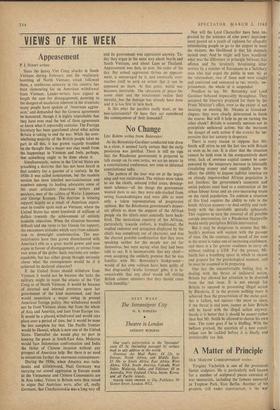VIEWS OF THE WEEK
Appeasement
P. J.. HONEY writes:
Since the heavy Viet Cong attacks in South Vietnam during February and the retaliatory
bombing of North Vietnam which followed them, a vociferous minority in this country has been clamouring for an American withdrawal from Vietnam. Leader-writers have argued at length the case for disengagement, pointing to the dangers of escalation inherent in the situation; many people have spoken of 'American aggres- sion,' and demanded that the Geneva agreements be honoured, though it is highly improbable that they have ever read the text of these agreements or know what it repeatedly contains. The Foreign Secretary has been questioned about what action Britain is taking to end the war. While the over- whelming majority of the British people takes no part in all this, it has grown vaguely troubled by.. the thought that a major war may result from the happenings in Vietnam and feels, perhaps, that something ought to be done about it, •
• Simultaneously, voices in the United States are preaching a doctrine that has not been heard in that•country for a quarter of a century. In the 1930s. it was called isolationism, but the modern version has been labelled neo-isolationism and numbers among its leading advocates some of the most articulate American writers and speakers, men of the calibre of Walter Lippmann and George Kennan. The doctrine is winning support largely as a result of American experi- ence in trouble spots such as Vietnam, where the United States has spent hundreds of millions of dollars towards the achievement of entirely laudable objectives. When the situation becomes difficult and she turns to her friends for support, she encounters attitudes which vary from admoni- tion to downright condemnation. The neo- isolationists have thus grown disenchanted with America's role as a great world power and now argue in favour of disengagement, or retreat from vast areas of the globe. Such reactions are under- standable, but has either group thought seriously about what the consequences would be if it achieved its declared objective?
If the United States should withdraw from Vietnam it would not be because she lacks the military might to resist the attacks of the Viet Cong or of North Vietnam. It would be because of external and internal pressures upon her government of the kind mentioned, and that would necessitate a major swing in present American foreign policy. Her withdrawal would not be from Vietnam alone, but from the whole of Asia and America, and later from Europe too. It would be a phased withdrawal and would take place over a period of time, but it would be none the less complete for that. The Pacific frontier would be Hawaii, which is now one of the United States. Thereafter she would play no part in keeping the peace in South-East Asia. Malaysia would face Indonesian confrontation and India the threat of Chinese invasion without any prospect of American help. But there is no need to enumerate further the enormous consequences.
During the 1930s, when America was isola- tionist and disinterested, Nazi Germany was carrying out armed aggression in Europe much as the Vietnamese and Chinese Communists are in Asia today. Voices in Britain were then raised to argue that Austrians were, after all, really Germans, that Czechoslovakia was a long way off
and its government was oppressive anyway. To- day they argue in the same way about North and South Vietnam, and about Laos or Thailand. Appeasement was then, as now, the order of the day. But armed aggression thrives on appease- ment, is encouraged by it, and eventually (pier- reaches itself to such an extent that it can be appeased no more. At that point, world war becomes inevitable. [he advocates of peace be- come silent and the isolationists realise their mistake, but the damage has already been done and it is too late to turn back.
Is this what the pacifists really want, or the neo-isolationists? Or have they not considered the consequences of their demands?


































 Previous page
Previous page